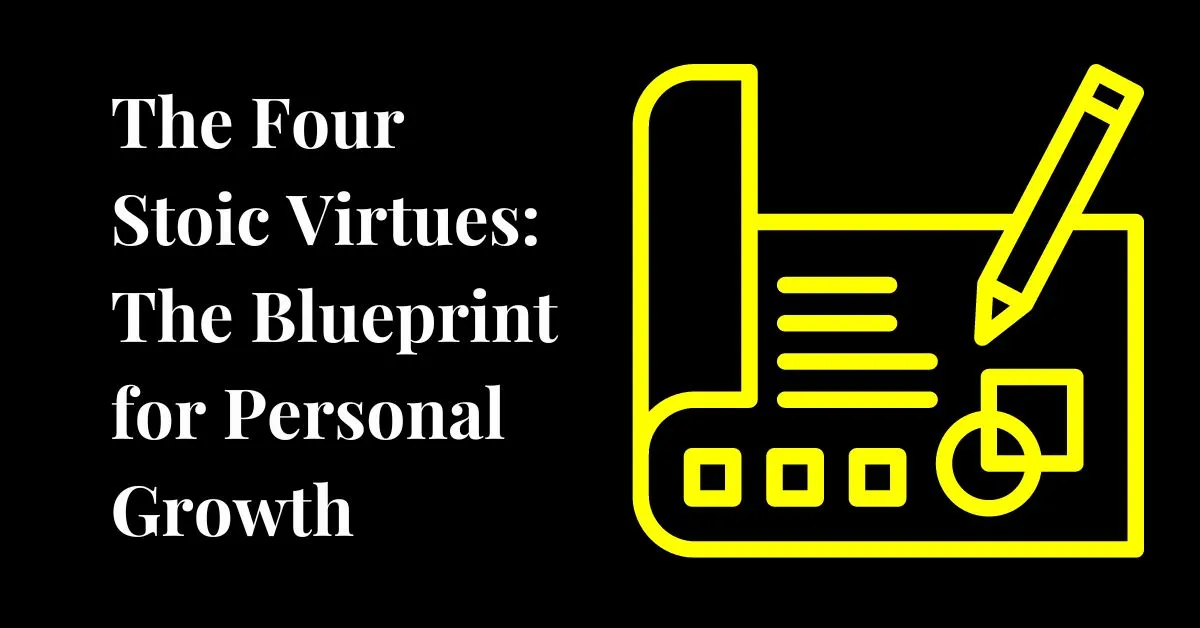At its core, Stoicism is all about living a good life by focusing on what you can control and accepting what you cannot. In this philosophy, virtues are an essential part of living a good life. So, what are the four Stoic virtues, and how can they help you in your daily life?
- Wisdom – Seeing things as they are and making good decisions based on that understanding.
- Courage – Acting in the face of fear.
- Justice – Treating people fairly and doing what’s right.
- Temperance – Avoiding excess and living a balanced life
Table of Contents
Wisdom
To practice wisdom, we can try taking a step back and looking at a situation objectively before making a decision. This approach can help us avoid impulsive decisions that we may later regret.
For example, if a friend cancels plans at the last minute, instead of getting upset, you could try to understand their perspective and see the situation from their point of view. In the workplace, wisdom might mean seeking advice from more experienced colleagues before making important decisions.
“The wise man is neither raised up by prosperity nor cast down by adversity; for always he has striven to rely predominantly on himself and to derive all delight from himself.”
Seneca
Courage
Practicing courage might mean standing up to a bully or speaking out against an injustice. It could also mean facing your fears and trying something new.
In relationships, this might mean having difficult conversations with your partner or standing up for yourself when your boundaries are being crossed. At work, courage might mean speaking up against unethical practices or taking on new challenges outside of your comfort zone.
“It is not that we have a short time to live, but that we waste a lot of it. Life is long enough, and a sufficiently generous amount has been given to us for the highest achievements if it were all well invested. But when it is wasted in heedless luxury and spent on no good activity, we are forced at last by death’s final constraint to realize that it has passed away before we knew it was passing. So it is: we are not given a short life but we make it short, and we are not ill-supplied but wasteful of it… Life is long if you know how to use it.”
Seneca
Justice
Being just means treating others with fairness and respect. This might mean advocating for the rights of others or making sure everyone has an equal opportunity to succeed.
Practicing justice might mean treating your partner with respect and equality, and not taking advantage of their vulnerabilities or weaknesses. It might also mean advocating for fair and equal treatment of all employees, regardless of their race, gender, or other differences.
“Never value anything as profitable to thyself which shall compel thee to break thy promise, to lose thy self-respect, to hate any man, to suspect, to curse, to act the hypocrite, to desire anything which needs walls and curtains.”
Marcus Aurelius
Temperance
Practicing temperance might mean avoiding unhealthy habits like overeating or overspending. It could also mean taking time for self-care and making sure you’re not neglecting other areas of your life.
This might mean balancing your own needs and desires with those of your partner, and not giving into excess or indulgence. Temperance might mean avoiding overworking and finding a healthy work-life balance.
“It is not that we have a short time to live, but that we waste a lot of it. Life is long enough, and a sufficiently generous amount has been given to us for the highest achievements if it were all well invested. But when it is wasted in heedless luxury and spent on no good activity, we are forced at last by death’s final constraint to realize that it has passed away before we knew it was passing. So it is: we are not given a short life but we make it short, and we are not ill-supplied but wasteful of it… Life is long if you know how to use it.”
Seneca
Conclusion
The four Stoic virtues can be powerful tools for living a good life. By practicing wisdom, courage, justice, and temperance, we can become more resilient, compassionate, and fulfilled individuals.
Remember, these virtues are not just abstract concepts; they are practical skills that can be applied in our daily lives to help us become the best versions of ourselves.
As Epictetus said, “No man is free who is not a master of himself.” By practicing these virtues, we can learn to be masters of ourselves and live a life of purpose and meaning.

